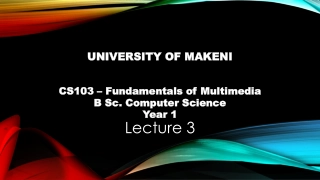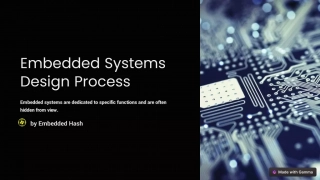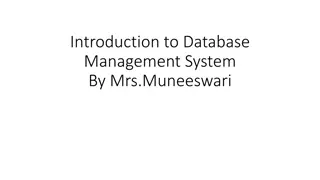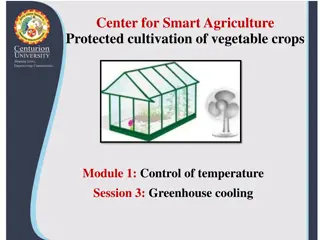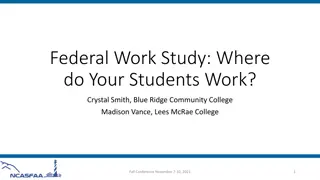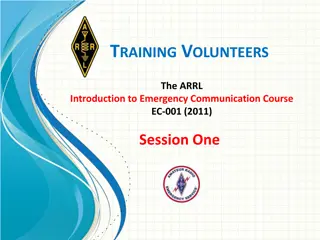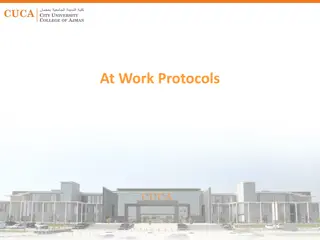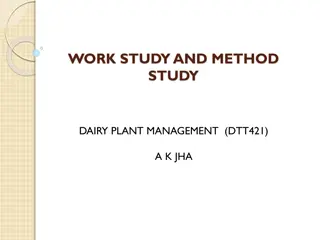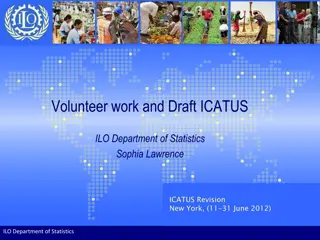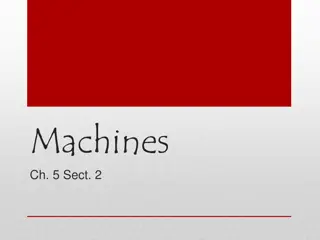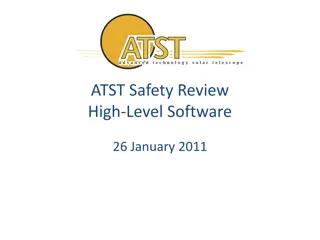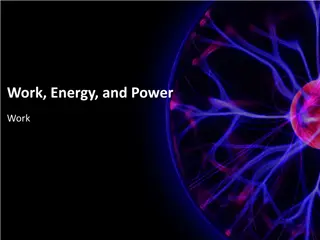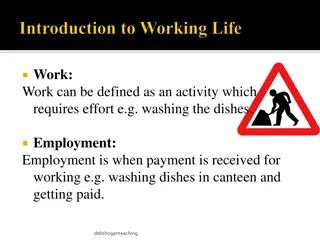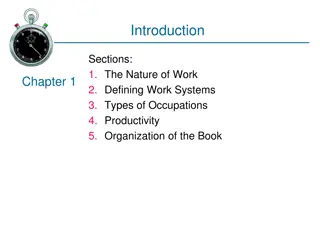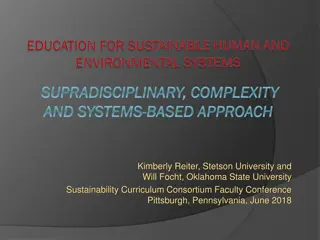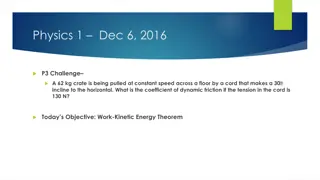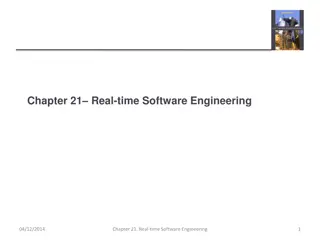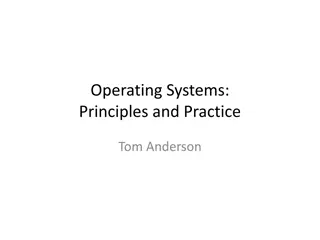Understanding Multimedia Systems: Hardware and Software Components
Multimedia systems require specific hardware and software components to meet the demands of producing and playing multimedia content. Development systems are used for creating content with higher specifications, while playback systems are used for playing multimedia files with lower specifications.
8 views • 46 slides
Embedded Systems Design Process in the Embedded systems
Embedded systems are all around us, from the tiny microcontrollers in our household appliances to the sophisticated control systems in cars and aeroplanes. But how are these systems designed? Let's delve into the basics of the embedded systems design process in simple terms that anyone can understan
2 views • 9 slides
The Importance of Work Experience in Career Development
Understanding the significance of work experience in shaping career paths is crucial for young individuals. Mentioning work experience in UCAS statements and apprenticeship applications can highlight key skills and industry knowledge. Testimonials emphasize the value of gaining practical insights an
0 views • 15 slides
Overview of Distributed Systems: Characteristics, Classification, Computation, Communication, and Fault Models
Characterizing Distributed Systems: Multiple autonomous computers with CPUs, memory, storage, and I/O paths, interconnected geographically, shared state, global invariants. Classifying Distributed Systems: Based on synchrony, communication medium, fault models like crash and Byzantine failures. Comp
9 views • 126 slides
Operating Systems
An operating system is a crucial program that manages all other programs on a computer. It handles tasks like input recognition, file management, and device control. There are different types of operating systems such as single-user, single-task systems, multi-user, multi-task systems, real-time ope
6 views • 11 slides
Understanding Information Systems in Organizational Management
Management in organizations is divided into three levels: operational, tactical, and strategic. Each level requires different information systems to support various activities. Operational systems focus on routine transactions and control processes, while middle-level systems aid in semi-structured
9 views • 39 slides
Work Capability Assessment (WCA) Criteria Reforms May 2024
The Work Capability Assessment (WCA) determines if individuals claiming ESA and/or UC have limited capability for work (LCW) or work-related activity. Reforms aim to better support disabled individuals to engage with work. Consultation responses highlighted the need for changes in assessing disabili
0 views • 6 slides
Understanding Work in Physics
Exploring the concept of work in physics, this content covers how work is performed, when it is done, and the formula to calculate work based on force and distance. It highlights that the amount of work depends on the force applied and the distance moved, showcasing that different paths may require
0 views • 18 slides
Introduction to Database Management System Explained
This presentation covers the basics of database management systems, including definitions of data, types of data, structured and unstructured data, storing data in computers using file systems and database systems, and issues with file systems like data redundancy, inconsistency, difficult data acce
1 views • 18 slides
Understanding Different Types of Recommender Systems
Recommender systems play a crucial role in providing personalized recommendations to users. This article delves into various types of recommender systems including Collaborative Filtering, Content-Based, Knowledge-Based, and Group Recommender Systems. Collaborative Filtering involves making predicti
0 views • 7 slides
Efficient Greenhouse Cooling Systems for Smart Agriculture
Active summer cooling systems like fan-and-pad and fog systems are crucial for maintaining optimal temperatures in greenhouses. These systems work by utilizing evaporation to remove heat from the air. Fan-and-pad cooling systems have been in use since 1954, where water is passed through pads to cool
1 views • 23 slides
UCL Staff Feedback on Hybrid Work Model Implementation
UCL conducted a survey among staff to gather feedback on the interim guidance for transitioning back to onsite work. The survey highlighted staff support for a hybrid work model, emphasizing productivity, efficiency, and well-being benefits. Staff also expressed a preference for clear expectations a
2 views • 21 slides
Federal Work Study: Student Work Locations and Future Ideas
Explore insights from the Fall Conference 2021 on Federal Work Study (FWS), including student work locations, impacts of Covid, and ideas for the future. Learn about part-time employment opportunities for eligible students, on-campus and off-campus work options, and tips from Blue Ridge Community Co
0 views • 13 slides
Understanding Emergency Communication Systems for Volunteer Training
This content covers various topics related to emergency communication systems for volunteer training, including agency communication systems, government radio systems for police and fire departments, emergency medical radio systems, American Red Cross frequencies, and types of served-agency radio sy
2 views • 29 slides
Introduction to Embedded Systems Design
Embedded Systems Design, Chapter 1 provides an insightful overview of embedded systems, distinguishing them from general-purpose computers. The chapter delves into the characteristics of embedded systems, their design considerations, and the various types of embedded computers such as general-purpos
1 views • 7 slides
Understanding Work Study Methods in Industrial Engineering
Work study involves the systematic examination of methods to improve resource utilization and set performance standards. It includes method study, work measurement, and ergonomics to enhance efficiency and economy in various activities. Method study analyzes work processes for improvement, while wor
1 views • 21 slides
Work Protocols and Safety Measures for Employees Returning to Work
In the wake of the COVID-19 pandemic, these work protocols emphasize roles, responsibilities, and mental wellbeing of employees. Pre-work precautions at home, personal measures, testing procedures, increasing awareness, and safe travel guidelines are highlighted to ensure a secure work environment.
0 views • 16 slides
Understanding Medical Social Work and Its Impact on Patient Well-being
Medical Social Work, also known as Health Care Social Work, plays a crucial role in addressing the social, physical, and psychological needs of patients. Through providing case work, after-care, and convalescence services, Medical Social Workers contribute to reducing hospital readmissions, preventi
0 views • 12 slides
Gender Disparities in Unpaid Care Work and Earnings in China
Examination of gender discrepancies in unpaid care work and its impact on earnings in China using data from the 2008 China Time Use Survey. Women predominantly perform unpaid care work at home, limiting their labor market participation and contributing to gender pay gaps. The study explores the econ
0 views • 22 slides
Hot Work Procedures and Permits - Intrepid Policy Revised 04/2014
The Intrepid Policy outlines procedures and precautions for hot work, which includes operations involving open flames or heat production. The policy emphasizes safety measures such as flame removal, use of welding blankets, and obtaining permits. Alternative cold work methods are also suggested to e
0 views • 18 slides
Techniques for Improving Productivity in Dairy Plant Management
Work study and method study are essential techniques for enhancing productivity in dairy plant management. Work study involves method study and work measurement to analyze work processes, develop efficient methods, and determine standard times. Method study focuses on recording and evaluating work m
0 views • 11 slides
Understanding Volunteer Work in Statistical Frameworks
Volunteer work is defined as unpaid, non-compulsory work individuals undertake for organizations or directly for others outside their household. The measurement of volunteer work aligns with promoting decent work, encompassing both goods and services produced within and beyond the System of National
0 views • 14 slides
Understanding Machines: Work, Forces, and Efficiency
Machines play a vital role in making work easier by increasing force, distance, or changing the direction of applied force. Different types of machines like levers, pulleys, and inclined planes simplify work processes. Understanding input and output forces, as well as input and output work, is essen
1 views • 10 slides
Understanding Working Fluids in Thermodynamic Systems
Working fluids are essential in thermodynamic systems to transfer energy and perform work. This article explores the selection criteria, types, and work calculation involving working fluids in cogeneration and trigeneration systems. The properties, fluid types, and work processes are discussed to un
1 views • 14 slides
ATST Safety Review High-Level Software Overview
This document provides an overview of the high-level software components involved in the ATST Safety Review conducted on 26th January 2011. It includes details on the Telescope Software Control Systems, Observatory Software Control Systems, and Instrument Software Control Systems, along with respons
13 views • 15 slides
Understanding Work, Energy, and Power in Physics
Work, Energy, and Power are fundamental concepts in physics. Work is the transfer of energy that results in displacement, requiring a force applied over a distance. Energy is the capacity to do work, while Power is the rate at which work is done. Examples illustrate how work is calculated in differe
0 views • 67 slides
Exploring Work and Employment Dynamics
Work involves activities that require effort, while employment entails receiving payment for work done. Employers hire workers who work for them, while self-employed individuals work for themselves. Leaving school for the working world presents challenges like time and money management, new relation
0 views • 33 slides
Information Systems in Organizations: Overview and Implementation
Information systems play a crucial role in organizations, encompassing transaction processing systems, functional area information systems, and enterprise resource planning systems. This content delves into the purpose of transaction processing systems, the support provided by information systems ac
0 views • 30 slides
Sustainable Work Practices for a Balanced Life
Promoting sustainable work practices is essential for individuals to maintain a healthy work-life balance throughout their career. Key aspects include age-friendly work environments, job quality policies, and addressing various challenges faced by workers across different age groups. Ensuring job qu
0 views • 12 slides
Understanding the Relationship Between Work and Energy
Work and energy are closely related concepts in physics, where work involves the transfer of energy when a force is applied to move an object in the same direction. The equation for work is given by Work (joules) = Force (newtons) x Distance (m), and power represents the rate at which work is done,
0 views • 7 slides
Understanding the Nature of Work Systems and Occupations
Work is the core activity that involves physical and mental effort to achieve a specific task with commercial value and compensation. From historical figures to the pyramidal structure of work elements, tasks, and productivity, this chapter explores the essence of work, its definition in physics, an
0 views • 41 slides
Understanding Control Systems for Optimal Occupant Comfort
Explore the essentials of control systems for maintaining occupant comfort, covering topics such as sensors, feedback loops, controlled devices, operational differences between pneumatic and electric actuators, and various types of control systems including pneumatic, electric, analog, and digital.
0 views • 22 slides
Understanding Cascade Control Systems in Industrial Processes
Cascade control systems play a crucial role in improving process control efficiency by incorporating feedback loops within feedback loops. This type of control architecture helps to better handle disturbances and variations in the process by creating secondary loops that monitor specific parameters.
0 views • 8 slides
Sustainable Education for Human and Environmental Systems
Sustainable Education for Human and Environmental Systems (SHES) focuses on fostering sustainable societies through social learning and systems thinking. It aims to promote interconnectedness between human and environmental systems, with a vision of enhancing well-being while maintaining the viabili
0 views • 19 slides
Principles of Motion and Time Study in Work Design
Motion and Time Study are essential aspects of work design, focusing on maximizing efficiency, minimizing worker fatigue, and improving productivity. These studies involve developing systems, standardizing work methods, determining time standards, and training operators. Work is defined as a livelih
0 views • 53 slides
Understanding Embedded Systems and Cyber-Physical Systems
Embedded systems are specialized computer systems embedded within larger systems, such as control systems and car controllers. This lecture covers real-time aspects, applications of Cyber-Physical Systems (CPS), and examples like the Boeing 777/Airbus A380 cockpit. It discusses the design process of
0 views • 22 slides
Understanding Git: An Overview of Version Control Systems
Git is a powerful version control system that facilitates collaborative work and maintains a comprehensive history of project changes. It offers both Centralized and Decentralized/Distributed systems, with advantages and drawbacks for each. Centralized systems rely on a central server for collaborat
0 views • 37 slides
Understanding Work and Energy in Physics
This content covers the concept of work defined as the product of a force through a distance, positive and negative work scenarios, when work is not done, work at an angle, and work by a variable force. It also includes practice problems to enhance comprehension on the topic of work and energy in Ph
0 views • 11 slides
Understanding Real-time Software Engineering for Embedded Systems
Embedded systems play a crucial role in controlling various machines and processes. Real-time software engineering focuses on designing systems that respond instantly to events, ensuring correctness and timeliness. Characteristics like continuous operation, unpredictable environment interactions, an
0 views • 59 slides
Understanding Operating Systems: Principles and Practice in CSE Curriculum
Dive into the world of operating systems through the lens of "Operating Systems: Principles and Practice" by Tom Anderson. Discover how this course fits in the UW CSE curriculum, covering systems programming, operating system interfaces, and distributed systems. Explore the project work on building
0 views • 21 slides
